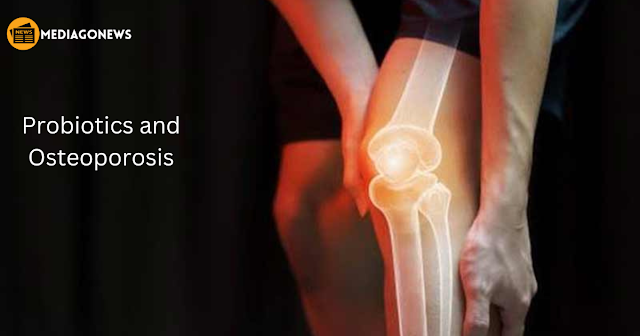It is no secret that taking a daily probiotic can provide many health benefits. However new research suggests that it may also help with bone health. A study published in the American Journal of Clinical Nutrition found that daily probiotic intake could significantly reduce bone loss in postmenopausal women. This finding raises the question is your daily probiotic doing enough for your bone health In this blog post we will discuss the potential benefits of probiotics for bone health and how you can get the most out of your daily probiotic.
Is Your Daily Probiotic Doing Enough For Your Bone Health
Probiotics are live bacteria and yeasts that are beneficial for our health particularly for gut health. They can be found naturally in some fermented foods or taken as a supplement. Recent research suggests that probiotics may also help promote bone health and help reduce the risk of osteoporosis.
Osteoporosis is a chronic condition that affects more than 200 million people worldwide and is characterized by a gradual weakening of the bones which can lead to increased fracture risk and disability. The primary cause of osteoporosis is an imbalance between the breakdown and formation of new bone tissue leading to low bone mass and strength.
The probiotic bacteria in daily probiotic supplements have been shown to have a positive effect on bone health by increasing calcium absorption stimulating the production of hormones that regulate bone metabolism and increasing the production of collagen an important component of bones. Additionally probiotics may help prevent bone degrading enzymes from breaking down bones.
By taking a daily probiotic you may be able to reduce your risk of developing osteoporosis and its associated fractures. It’s important to remember however that probiotics should not be used as a substitute for medications prescribed to treat existing osteoporosis but rather as an additional way to maintain bone health and reduce fracture risk. Talk to your doctor about whether adding a daily probiotic could benefit your bone health.
The Benefits of Probiotics
If you’re like most people you’re probably aware of the many benefits probiotics have to offer. Probiotics are living microorganisms that are beneficial to our health aiding in digestion and improving the balance of good and bad bacteria in our guts.
More recently research has started to show that probiotics may also be beneficial to bone health. Studies have found that daily probiotic use may help prevent bone loss and even support bone growth.
There is still a lot more research to be done in this field but the current findings are encouraging. Here’s what you need to know about the potential benefits of probiotics for your bone health.
First it’s important to understand how probiotics work in the body. They contain healthy bacteria that can help support the natural balance of bacteria in your digestive system. This helps promote better digestion which is key for getting essential nutrients into your body.
In addition probiotics can help regulate levels of inflammation which is linked to conditions like osteoporosis and arthritis. By reducing inflammation probiotics may help slow down the deterioration of bones.
Finally probiotics may help reduce the absorption of certain nutrients that can damage bones. These include sodium and phosphate which are commonly found in processed foods. By decreasing their absorption probiotics may help protect against bone loss and even support bone growth.
These potential benefits make daily probiotic use worth considering. While it’s no replacement for a balanced diet and exercise adding a daily probiotic supplement could be a great way to support your overall bone health. If you’re thinking of taking a daily probiotic supplement be sure to talk with your doctor first to make sure it’s right for you.
The best probiotics For Osteoporosis
If you’re looking for ways to support your bone health then taking a daily probiotic may be the answer. Probiotics are beneficial bacteria that can help regulate digestion boost immunity and even promote bone health. Research suggests that regular intake of certain probiotics can help improve bone density and reduce the risk of developing osteoporosis.
So which probiotics are best for bone health Here are a few that have been studied and proven to help improve bone health.
How To Take a Probiotic
Taking a daily probiotic can be beneficial for your overall health but did you know that it may also help to improve your bone health Research suggests that taking a probiotic supplement can help promote better absorption of calcium and other minerals that are important for maintaining strong bones.
Probiotics are bacteria that can help support your digestive system enhance nutrient absorption and reduce inflammation in the body. Probiotics can be found in foods such as yogurt kefir sauerkraut miso and kimchi as well as in probiotic supplements.
When it comes to taking a probiotic, there are a few important things to keep in mind. First look for a high quality supplement that contains several different species of beneficial bacteria. Second it's best to take the probiotic with food in order to help your body absorb the bacteria more effectively. And finally make sure to take your probiotic on a regular basis in order to get the most benefit.
By following these steps and making sure to get plenty of calcium-rich foods in your diet you can help ensure that your bones stay strong and healthy. Taking a daily probiotic may just be one of the keys to achieving optimal bone health.
Are There Any Side Effects
While probiotics are generally considered safe there are some potential side effects you should be aware of before taking a daily probiotic. It is possible to experience digestive issues such as gas bloating or diarrhea as well as skin reactions such as itching rashes or hives. As with any supplement, it is important to speak to your doctor before beginning a probiotic regimen to make sure it is safe for you.
Additionally some probiotics contain live organisms that may not be suitable for those with weakened immune systems. It is also important to keep in mind that probiotics may interact with certain.
Medications so it is best to check with your doctor before taking any probiotics while on medication.
Finally, if you have an existing medical condition or food allergies it is important to be aware that the type of probiotic you take can influence the risk of experiencing side effects. If you are unsure which probiotic would be best for you it is recommended to speak with a healthcare professional before making a decision.







No comments:
Post a Comment